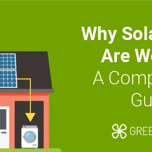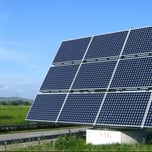Answer these simple questions and we will find you the BEST prices
Which type of solar quotes do you need?
It only takes 30 seconds
100% free with no obligation

Get up to 4 quotes by filling in only 1 quick form

Slash your energy bills by installing solar panels

For the average 2-3 bedroom house
- GreenMatch
- Blog
- The Lifespan of Solar Panels
How Long Do Solar Panels Last in the UK? (April 2025)

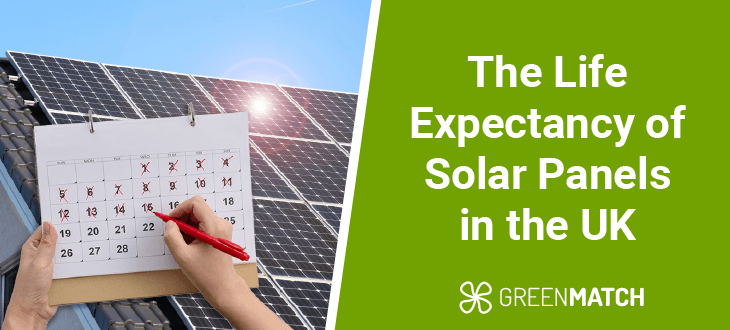
- Solar panels typically last 25-30 years, with increasing degradation afterwards. However, solar panels that have string inverters will need a new one after 10 to 15 years, while microinverters last 20 to 25 years.
- Reputable manufacturers back this up with 25-year production warranties, guaranteeing at least 80% efficiency during that period.
- Experts estimate that solar panels degrade between 0.2% to 0.5% per year.
- The lifespan of solar panels is influenced significantly by factors such as the quality of the solar panels, maintenance, and the climate you live in.
You might be wondering "How long do solar panels last?". Solar panels typically run at optimal efficiency for 25 to 30 years according to industry standards. They remain functional beyond that but with gradually less electricity per year. This extended lifespan ensures you'll enjoy the benefits of solar energy for decades.
Solar panels are a great option for homeowners interested in making their homes a little greener and avoiding the financial impact of ever-rising energy costs. Knowing that you will enjoy the benefits that come with these appliances for decades, then, is highly reassuring.
Having a better idea of the life expectancy of solar panels is not only great for your peace of mind, but it can also help you decide to purchase these appliances. Installing solar panels can be a substantial expense. However, with the estimated solar panel lifespan being 25-30 years, homeowners know that they can expect their investment to last them for years to come.
"What are the most efficient solar panels?" is a common question among those considering renewable energy options. While efficiency is a key factor, it's also important to understand that solar panels degrade over time, impacting their efficiency and your potential savings. Eventually, you may notice diminished cost savings from your solar panels, signalling the need for replacement.
By replacing aging panels, you can ensure you're not overspending on energy bills while continuing to generate sustainable energy for your home. Regularly assessing the efficiency of solar panels and considering advancements in technology can help you maintain optimal energy production and savings over time.
Due for a solar panel replacement or looking to install your first solar panels? We can help you get the process started. Looking for new solar panels and finding trusted installers can take up hours of your time. With our simple form, this can take you less than 1 minute.
By clicking below, you can fill in our 30-second form to request quotes for solar panels Scotland, Wales, England or Northern Ireland. You can then compare the quotes you receive to find the best deal for new solar panels for your home.
Get started today by requesting free, no-obligation solar panel quotes!
- Quotes from local engineers
- Payment by finance available
- Save up to £1,110 per year
It only takes 30 seconds



Lifespan of solar panels in the UK
Today, solar panel manufacturers promise a lifespan of more than 25 to 30 years for new solar panels before significant degradation sets in. The degradation rate of solar panels typically ranges from 0.5% to 0.8% per year. This means that after 25 years, panels might still operate at 75% to 87.5% of their original efficiency, depending on the specific degradation rate. So your solar panels can be operational for 40 years or more at a lower efficiency rate.
However, different circumstances can lower the life expectancy of your solar panels. Factors such as weather conditions, quality of the installation, and cleanliness all affect your solar panels and can make them deteriorate at a quicker rate.
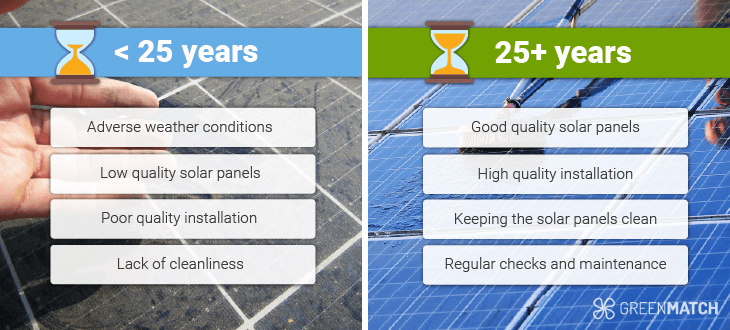
To ensure that your solar panels can operate for the duration promised by manufacturers, you will want to conduct regular checks and maintenance. By doing so, you can monitor the efficiency of your solar panels and make sure that they are still adequately providing energy for your home.
Before choosing to install solar panels for your home, you will also need to consider their degradation rate and the different factors that affect the lifespan of this energy source. You can learn more about this below.
How does solar panel degradation work?
While the quality of the solar panels and their installation plays an important role in guaranteeing the estimated lifespan of 25 years or more, over time they will become less efficient. This is a result of the degradation process that all solar panels go through.
The degradation rate of solar panels is calculated as a percentage. Specialists estimate that most solar panels degrade at a rate of around 0.2-0.5% per year. This means that the output of usable energy for your home that comes from your solar panels decreases slowly over time.
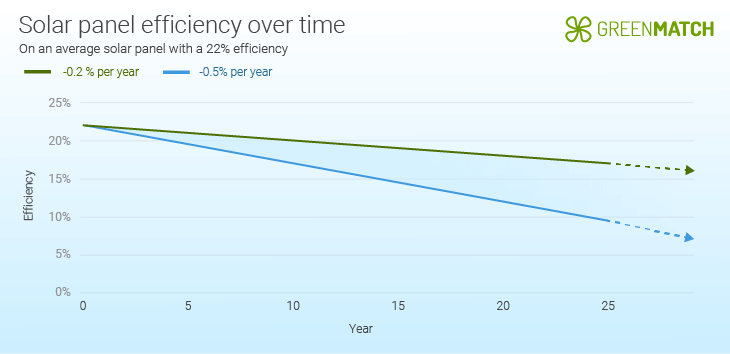
There are a few different types of degradation that can occur. It can be age-related, light-induced, potential-induced, related to thermal cycling, caused by damp heat or humidity freeze, or due to UV exposure.
Age-related degradation: In time, it is natural to notice some wear and tear when it comes to your solar panels. Because they are exposed to different weather conditions such as humidity, strong winds, and high temperatures, you can expect some damage to your solar panels.
What happens is that these factors can lead to frame corrosion, can cause the crystalline silicon to harden, or lead to cell contamination. Adverse weather conditions can also damage the surface of the panel and disrupt adequate sunlight absorption.
Light-induced degradation (LID): This kind of degradation occurs when the solar panels are first exposed to sunlight. In this case, traces of oxygen in the silicon wafer lead to a power stabilisation phase that leads to a degradation rate of about 0.25% to 0.7% per year.
Potential-induced degradation (PID): When solar panels are exposed to high voltage and high temperatures, potential-induced degradation occurs. This can lead to a loss of up to 30% when it comes to generating energy.
Thermal cycling: This phenomenon refers to the contraction and expansion of solar panels when temperature changes occur. As a result of thermal cycling, microcracks can appear and reduce the efficiency of your panels in the energy production process.
Damp heat: High temperatures and high humidity levels can lead to the corrosion of your solar panels.
Humidity freeze: When solar panels are exposed to high humidity and then rapidly cooled by low temperatures, cracks on the surface of the solar panels can occur.
UV exposure: UV radiation can lead to the degradation of your solar panels by causing the encapsulation material to deteriorate.
Which factors influence solar panel life expectancy?
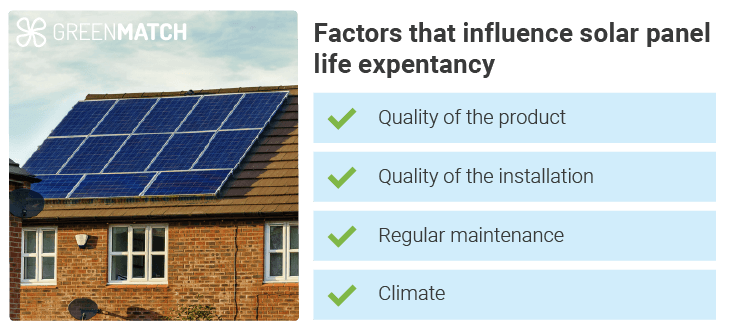
Some of the most important factors that determine the lifespan of your solar panels are the quality of the product, the quality of the installation, regular maintenance, and climate.
The quality of the product plays a crucial role in the lifespan of your solar panels. Opting for high quality products means that you are choosing solar panels that are built to last for decades.
The quality of the installation is also an important consideration. Working with a specialist who can determine the best position for the solar panels on your roof ensures that they will have enough sunlight exposure to generate energy efficiently. What is more, quality installation also plays a role in how well your solar panels can withstand various weather events.
Regular maintenance is important to maintain the expected lifespan of your solar panels. Checking for and repairing any damage, as well as keeping your solar panels clean ensures that they can operate efficiently. So, with the proper solar panel maintenance, your home will be producing its own energy for decades.
Climate and weather conditions significantly contribute to the lifespan of your solar panels. For instance, high temperatures can cause the materials of the solar panels to degrade at a quicker pace than in places with a moderate climate. Frost, humidity, and strong winds also play a large role in the degradation process, as they can damage the surface of the solar panels.
While homeowners, manufacturers, and solar installers are responsible for the first three characteristics, climate is one that no one can control. Keeping the UK’s climate and weather conditions in mind, you can rest assured that, in most regions, your solar panels will have enough sun exposure to generate energy and will be relatively safe from severe weather conditions.
However, after some time and continued exposure to various types of weather, your solar panels will start to degrade. So, if your solar panels are damaged or have finally run their course when it comes to efficiency, you will want to install some new ones for your home.
Finding quality panels and expert installers can be a difficult task that can take up hours of your spare time. Fortunately, we have made the first step towards your home improvement much easier.
Instead of wasting hours of your time researching solar panel installers, you can get started in under 1 minute! With our simple form, you will be able to request quotes from up to 4 local solar panel installers. They can help you determine which solar panels work best for your home based on your energy requirements and provide competitive offers so you know you’re not being overcharged on installation.
Get started today by clicking below to get free, no-obligation quotes.
- Quotes from local engineers
- Payment by finance available
- Save up to £1,110 per year
It only takes 30 seconds



How do I increase solar panel lifespan?
Here are some useful tips to prolong the lifespan and efficiency of your solar panels:
Keep your solar panels clean

To make sure that your solar panels can operate efficiently, you must keep their surface clean of any debris. This ensures that they can adequately absorb sunlight and convert it into usable energy for your home.
Cleaning your solar panels does not require a great deal of effort on your part. Should you require a more thorough cleaning, you will want to contact a specialist who can either instruct you on how to clean your solar panels or offer you their cleaning services.
Ensure regular checks and maintenance

The lifespan of your solar panels is also highly dependent on regular maintenance. Checking that your panels aren’t damaged and that the process of converting sunlight into energy is efficient is important to ensure that you are maximising this renewable energy source.
However, you must keep in mind that even with the necessary precautions, you cannot delay the inevitable. Eventually, because of the degradation rate of solar panels, yours will also lose their efficiency over time. In that case, you will want to look into replacing your solar panels and keep enjoying free green energy in your home.
Seek quality panels and installation
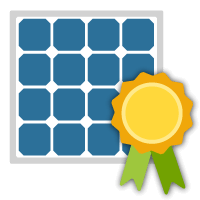
One of the best ways to guarantee that your solar panels operate for their expected lifespan of 25-30 years is to choose high quality panels and to work with a specialist when it comes to their installation.
Even though degradation is inevitable, there are a few things you can do that will help maintain or even increase the lifespan of your solar panels. Choosing quality, durable products with a proven reduced degradation rate is a great first step towards enjoying green and free energy in your home for decades.
Another way to ensure the life expectancy of your solar panels is to check the kinds of warranties and extended warranties offered by manufacturers and installers. Even though these cannot halt solar panel degradation, they do allow you to account for possible damage, for instance that caused by extreme weather conditions.
When should I replace solar panels?
You will want to upgrade your solar panels the moment you realise that they are no longer helping you successfully save on your energy bills. Even though there have been significant improvements when it comes to manufacturing solar panels, delaying the degradation process by quite some years, it is inevitable that after a long time your solar panels will lose some of their efficiency.
This should only happen sometime after 25-30 years. After this time, even though they might not operate at maximum efficiency, your solar panels will continue to generate energy in a way that does not require immediate replacement. Because of the high cost of purchasing and installing new solar panels, you will want to stretch out the lifespan of your appliances as much as you can without your bank account suffering.
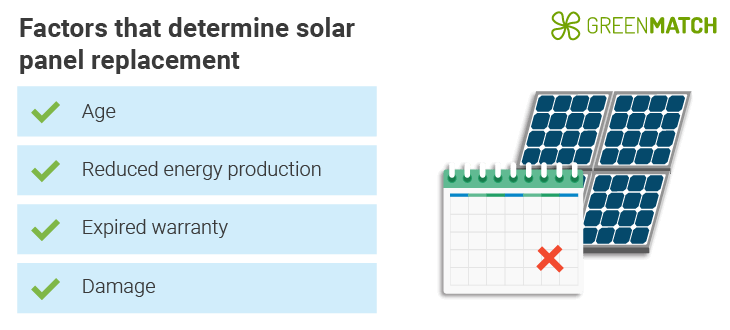
Even though they are a substantial initial expense, new solar panels can have your home running on sustainable and free energy for years. As far as solar panel costs go, you can expect to pay around £400-£500 per standard 250W panel. The price also depends on the type and size of the installation you choose for your home. We estimate that for the commonly chosen 4kW solar panel system, you will be spending around £5,000 - £6,000 to cover around 29 square metres of your roof.
Although purchasing and installing solar panels can be quite an investment, you will enjoy the benefits of this choice for decades. Not only are they built to function efficiently for around 25 years, but most manufacturers today offer warranties of 25 years or more. So, you will find that the advantages of solar panels can outweigh their initial cost. This and more can be found in our 'should I get solar panels?' guide.
If you decide that it is time to upgrade your solar panels, we can help you get the ball rolling. Choosing the right product and installer for your home is crucial to ensuring the long life of your solar panels. Doing your due diligence on companies and prices, then, should not be taken lightly.
But making an informed decision does not have to be as daunting as it seems. It is all too easy to spend hours or even days on research. But we have made it possible for you to get the process started in 30 seconds!
By filling in our short form, you avoid wasting time looking up companies. Instead, you can reach out to up to 4 local solar panel installers to request quotes for product and installation costs for your home. By comparing the information you receive from them, you ensure that you are not being overcharged for your installation.
Start your next home improvement journey today by clicking the link below. Our service is quick, easy, and completely free!
- Quotes from local engineers
- Payment by finance available
- Save up to £1,110 per year
It only takes 30 seconds



FAQ
Your solar panels need sunlight to generate usable energy for your home. Their lifespan will still be around 25 years, but the way they generate energy is dependent on climate, weather conditions, and exposure to the sun.
The main reasons for degradation are climate and extreme weather conditions. In regions with high temperatures, solar panel degradation occurs faster than in places with a moderate climate. Cold weather, humidity, and strong winds can also damage solar panels and contribute to their degradation.
Specialists estimate that solar panels will operate efficiently for around 25 years. However, any damage to the solar panels will shorten their life expectancy. On the other hand, your solar panels might last longer, but you should check that they are still generating energy efficiently.
While the average life expectancy of solar panels is around 25 years or more, you will want to replace your solar panels when you notice signs of solar panel degradation. Checking the efficiency with which your solar panels are operating allows you to ensure that you are not overspending on your energy bills.
Your solar panels will still generate energy for your home after 25 years. However, you might start to notice signs of degradation after this time. Always check whether your appliances are still operating at their most efficient and saving you money on your energy bills.

Sabria Schouten is a content writer who aims to make information about sustainable energy broadly available. She believes that knowledge about how to lead a greener lifestyle should be easily accessible to anyone.
We strive to connect our customers with the right product and supplier. Would you like to be part of GreenMatch?


